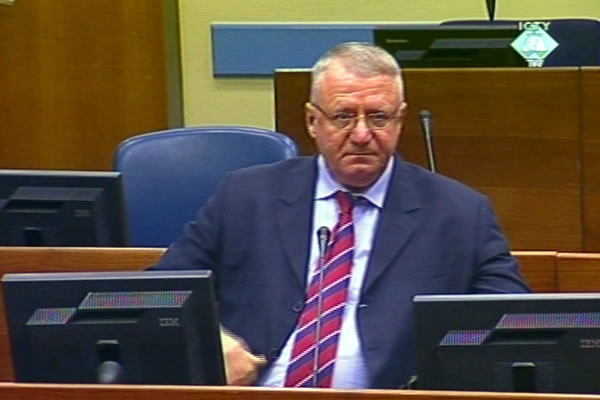Home
SESELJ TO GET MONEY IN A ‘DANGEROUS PRECEDENT’
The Appeals Chamber voted with a narrow majority to confirm the decision of Judge Antonetti’s Trial Chamber ordering the Registry to finance Vojislav Seselj’s defense team despite the fact that the accused has refused to provide information about his financial status. Seselj has demanded money for his legal team as a condition for opening the defense case. In a separate opinion, Judge Pocar described the majority decision of the Appeals Chamber as a ‘dangerous precedent’
 Vojislav Seselj in the courtroom
Vojislav Seselj in the courtroom With three votes for and two votes against, the Appeals Chamber rejected the Registry’s appeal against the decision in which Judge Antonetti’s Trial Chamber ordered the Registry to pay the expenses of Vojislav Seselj’s five-member defense team to the amount of ‘ 50% of the funds allocated in principle to a totally indigent accused’. This will be the first time that the Tribunal will finance the defense of an accused who has refused to provide information about his financial status.
In his appeal against the decision to finance the defense, the Registrar noted that the Trial Chamber had no right to make decisions on the financing of defense. The Appeals Chamber dismissed the argument by a narrow margin, stating that the judges are duty-bound to ensure a ‘fair and expeditious’ trial. The judges therefore have a discretionary power to decide about funding of the defense. Legal assistance to the accused who represent themselves is not ‘just an administrative matter but may also impact the substantive rights of an accused to a fair trial’, the judges say in the appellate decision.
The majority in the Appeals Chamber – judges Vaz, Meron and Morrison – insisted that the decision to pay for Seselj’s defense was merely a ‘temporary measure’ implemented until the actual financial situation of the accused could be established. If it turns out that Seselj’s financial status allows him to finance his own defense, the Registry would be able to recover the funds paid to Seselj, the judges note in their majority decision.
Although Judge Mehmet Guney considers that the Trial Chamber has the right to decide on the financing of defense, in a separate and partially dissenting opinion he says that according to the Tribunal’s jurisprudence the Trial Chamber was not supposed to set the exact amount that should be paid. On the other hand, former Tribunal’s president Fausto Pocar disagreed substantially with the majority decision.
The Tribunal’s rules are clear: only the Registry is authorized to deal with issues related to the funding of the defense, Judge Pocar noted. Moreover, the Trial Chamber can only respond to the Registrar’s decisions, not make its own. To make it even "worse’, the judges interfered in the issue of the funding of the defense even though Seselj had not appealed against the Registry’s decision at all, Pocar said. This is why Pocar ‘strongly’ opposes the majority decision that approves the funding of the defense of the Serbian Radical leader despite his continuous refusal to submit information about his financial status.
Judge Pocar believes this is a ‘dangerous precedent’ that will shift the burden of proof of the financial status from the accused to the Registry. It would be ‘naive to believe’ that the accused, who has so far refused to cooperate with the Registry, will agree to pay back the funds he receives if in the meantime it turns out that he has been able to fund his own defense, Judge Pocar added.
At a hearing earlier this month, the judges dismissed his motion for the acquittal. Seselj then said he would not call any evidence in his defense unless he was paid € 1.3 million for the current expenses of his defense team. The Appeals Chamber now accommodated him, but it is hardly likely that Seselj will be satisfied. The judges’ decision to pay Seselj ’50 percent of amount regularly allotted to the indigent accused’ is valid as of the day it is issued, i.e., 29 October 2010. In other words, Seselj’s defense team has so far earned no more than €120,000, less than 10 percent of the amount the accused has demanded as a condition for opening the defense case.
This is not the first time that the Appeals Chamber showed itself willing to accommodate Seselj when he sets conditions for his participation in the trial for crimes in Croatia, Vojvodina and Bosnia. In December 2006, Seselj went on hunger strike to force the judges to invalidate the decision of the Trial Chamber appointing a stand-by counsel, and to grant all the other requests as a condition of stopping the hunger strike and returning to the courtroom.
Linked Reports
- Case : Seselj
- 2011-05-05 ANTONETTI FOR CONTINUATION OF SESELJ TRIAL
- 2011-05-04 SESELJ’S MOTION FOR ACQUITTAL REJECTED
- 2011-03-25 JUDGE ANTONETTI’S DARK THOUGHTS
- 2011-10-26 AMICUS CURIAE: NO GROUNDS FOR CONTEMPT CASE AGAINST CARLA DEL PONTE AND HER PROSECUTORS
- 2011-10-28 SESELJ’S COMMUNICATIONS WILL BE MONITORED
- 2011-10-31 CLOSING ARGUMENTS AT SESELJ TRIAL SCHEDULED FOR MARCH 2012
